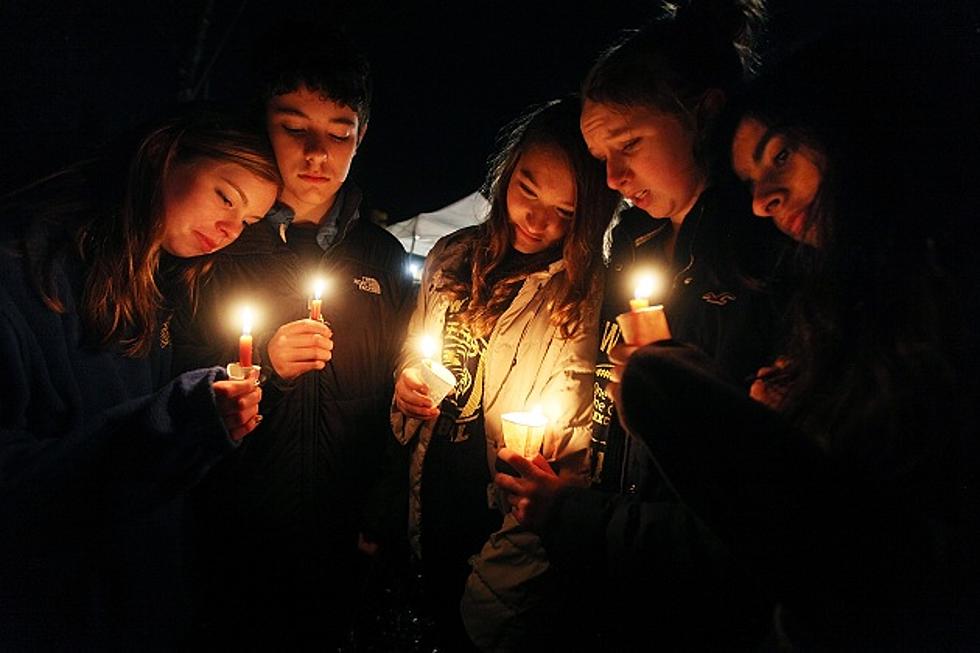![Experts Discuss How To Talk With Your Kids About Connecticut Shooting [Video]](http://townsquare.media/site/45/files/2012/12/connecticut-shooting-spencer-platt-getty-images-630x420-300x200.jpg?w=980&q=75)
Experts Discuss How To Talk With Your Kids About Connecticut Shooting [Video]
It is hard for adults to understand and deal with what happened in Newtown, Connecticut on December 14.
What about kids?
We have expert advice on how to discuss tragic events with children.
Nobody is more of an expert on the needs of your child than you. Experts offer valuable insight, but it is up to parents to decide how to apply that knowledge when dealing with their own children.
WZZM shares information about the best ways to discuss the shooting with you kids:
How do I tell my kids about the shooting without scaring them too much?
There are a couple of pieces [of information] you need to convey to kids and it's very different depending on the age of the kids. A 5- or 6-year-old needs to be reassured and told that this is something that happened, and it's terrible, but their parents are in charge of taking care of them and will do their best to never let anything happen to them. It's designed to reassure a smaller kid.
Rare Event: An older child has a much larger understanding of this. They need to be talked to about the randomness of these events and the fact that this happened in a place that is very popular among teenagers, but could've happened anywhere. It could have happened in a supermarket, shopping mall, airport. Unfortunately there are very disturbed people out there who do this kind of thing, but it is very rare and very random and the adults in the world are doing the very best they can to make sure these things don't happen.
One of the components of the traumatic experience is the violation of a feeling of safety and compatibility in the world. Kids have the added component that those who are supposed to protect them, parents and the larger community, have failed to do that. That sense of safety is critical to everyone, but maybe especially critical to kids - [they] are less responsible for their own safety; part of their world is that adults take responsibility for them. [The traumatic experience is] a violation of expectations they have about the world. In the short term, everyone needs to integrate this experience with their understanding of the world.
What shouldn't I do?
Parents should always be prepared to deal with emergencies with kids. Whether physical emergency or emotional emergency, they shouldn't be standing there totally lost and not tell their kids what to do. Kids take their lead from their parents, and if parents can handle something and talk about it and be reasonably calm, that's what the kid will do. If a parent is hysterical, it will be very frightening for a child. If a parent can be reasonable and have a sense of what they want to say and how to talk to a kid about it, it will be much more reassuring.
How do I know my child is dealing with the event appropriately? When should I be concerned?
Having a nightmare might certainly be a normal [response], with all the kids talking about the shooting. Kids expressing anger or rage that someone has ruined something for them and having anxiety for a short period of time might also be normal. But if our experiences are any indicator, most of us can recover from traumatic events with surprising rapidity. It's when these symptoms or difficulties persist for a period of time that we need to become a little more concerned. If someone is still ruminating about this a week later, I would sit down and ask if they want to talk to anyone about it. Ask, 'Is anything wrong? Are you worried about something?' You can even list multiple possibilities and include the one thing you think it might be. Sometimes kids just don't want to say it out loud.
One really important thing to keep in mind is there is a wide range of normal responses to this type of event. Parents and kids can expect to experience both positive and negative emotions. Sometimes people worry if they feel happiness after an event like this, but that is normal. It's also normal to experience uncertainty, fear and concern. I would tell parents of children to be ready to listen. Expect that sometimes your child will not want to talk and sometimes your child will want to talk a lot about it. That can go on longer than someone might expect. Do not tell them something they're feeling is not O.K. to be feeling.
The shooting is all over the news. I want my kids to be informed, but how much should they watch?
I don't think young kids should watch this kind of stuff, or this repetitive reporting on television. Exposure for younger kids should be limited as much as possible. It's impossible these days to completely prevent it, but limit it.
For adolescents, it's always a good idea to have a parent in the room so the event can be discussed and their anxieties and concerns can be addressed on the spot. Adolescents are going to see it no matter what because they are independent, but if you're watching it on a TV at home or on the radio it's always a good idea to have a parent there to talk to.
What if I overreacted to a traumatic event in front of my kids? Did I blow it?
You can apologize for your behavior and say, 'Look, I was pretty upset, I think I may have overreacted and I didn't need to frighten you. This is something we can talk about and deal with.' Parents can certainly reissue a level of behavior. We all make mistakes in parenting and we can always apologize for those mistakes and we get a little do-over from our kids.
More From 100.5 FM The River









